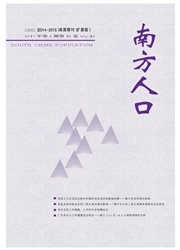

 中文摘要:
中文摘要:
我国计划生育利益导向政策可大致分为早期主要控制人口数量的利益导向政策和当前倾向于综合治理的利益导向政策两个时期.本文在回顾计划生育利益导向政策的演变历程的基础上,利用1991-2010年我国29个省的面板数据实证分析了计划生育利益导向政策对家庭发展的影响,研究发现,相比较于以控制人口数量为主的计划生育利益导向政策,倾向于综合治理的计划生育利益导向政策对生育水平的影响效应更强,并且更有利于家庭经济状况的改善.在倾向于综合治理的计划生育利益导向政策的实施下,家庭会调整发展策略,通过风险外部转移和加强人力资本投资等多种方式,缓冲由于子女数量减少导致的不确定风险增加.
 英文摘要:
英文摘要:
China's benefit-oriented family planning policy can be divided roughly into two stages: early stage of population control and current comprehensive governance. The review of the changing process of benefit-oriented family planning policy and an analysis of the panel data of 29 provinces between 1991 to 2010 found that comprehensive governance policy boast of much stronger impacts on family development and is more conducive to the improvement of domestic economy compared with the population control policy. Under the comprehensive governance policy, families tend to adjust development strategy to relieve the uncertain risks resulted from children decrease by external transfer of risks and better investment of human capital.
 同期刊论文项目
同期刊论文项目
 同项目期刊论文
同项目期刊论文
 期刊信息
期刊信息
